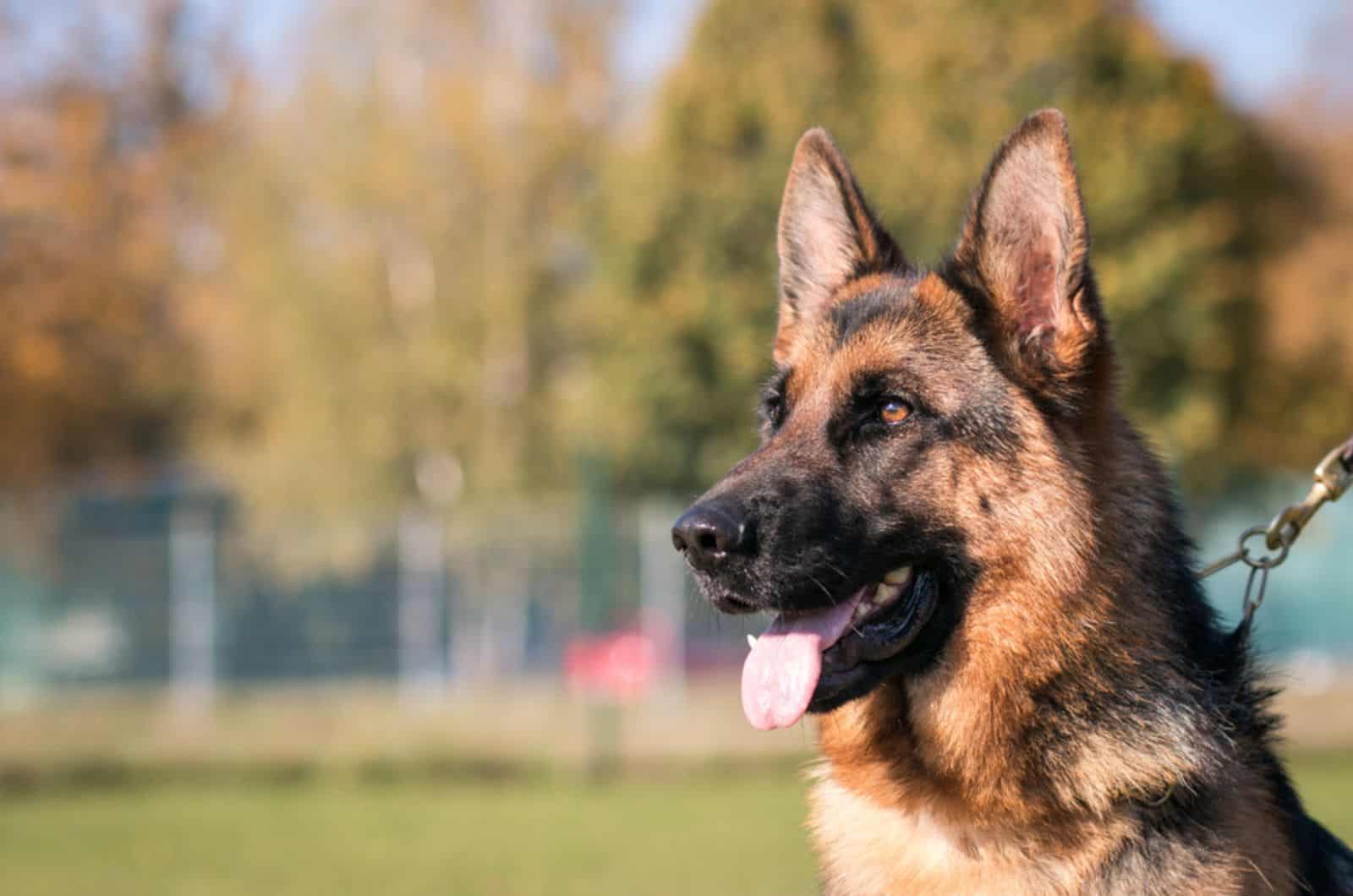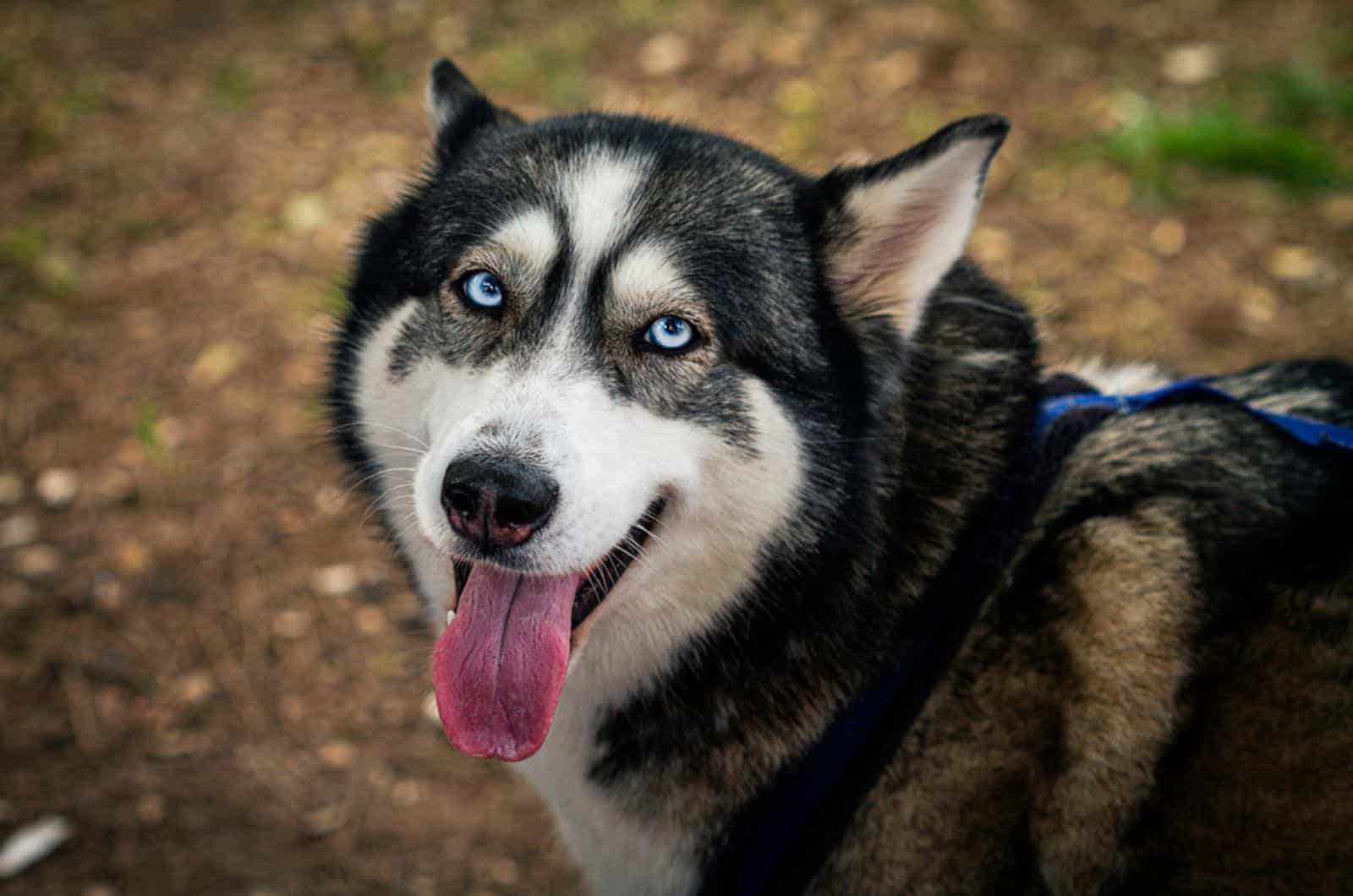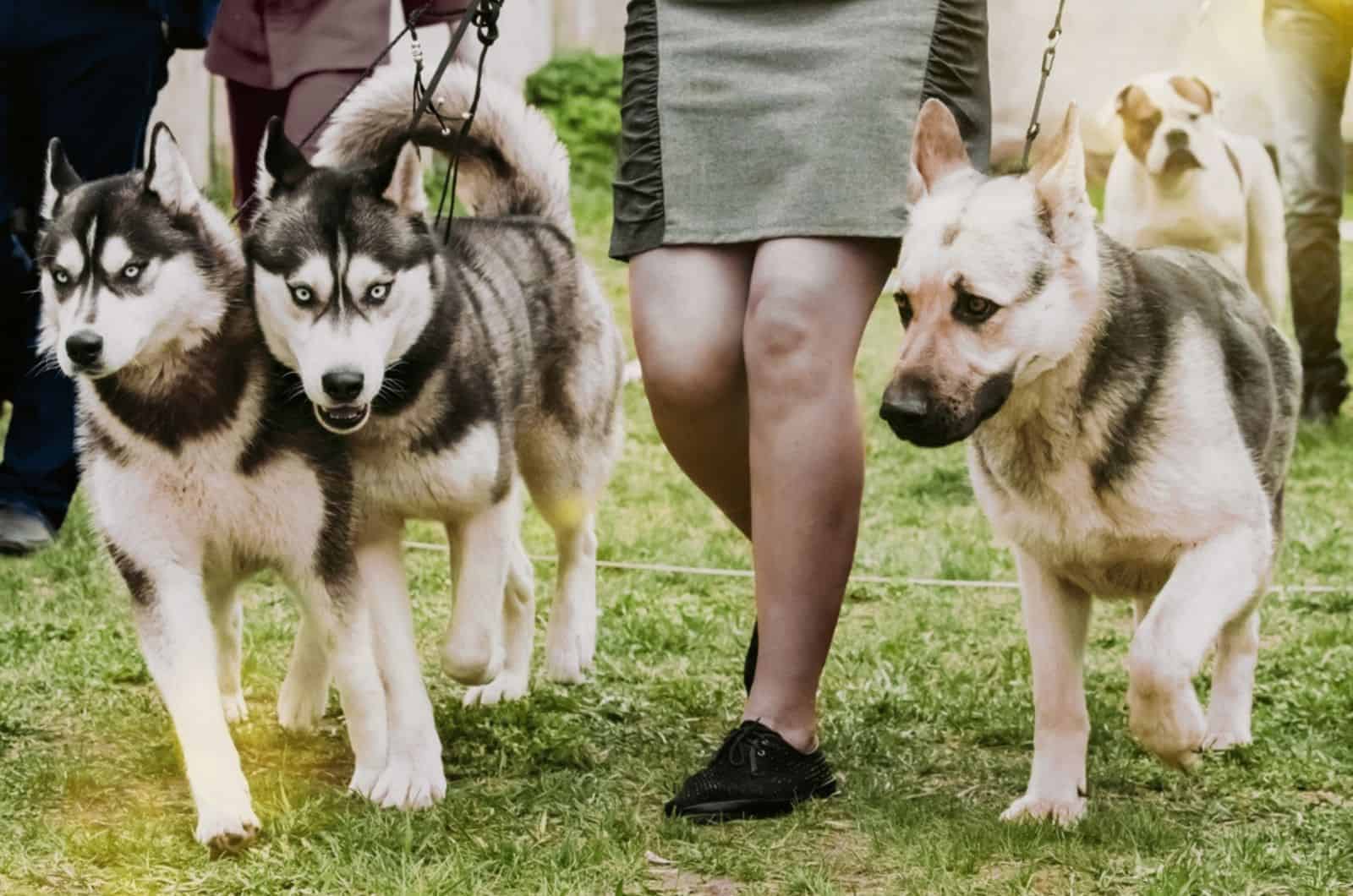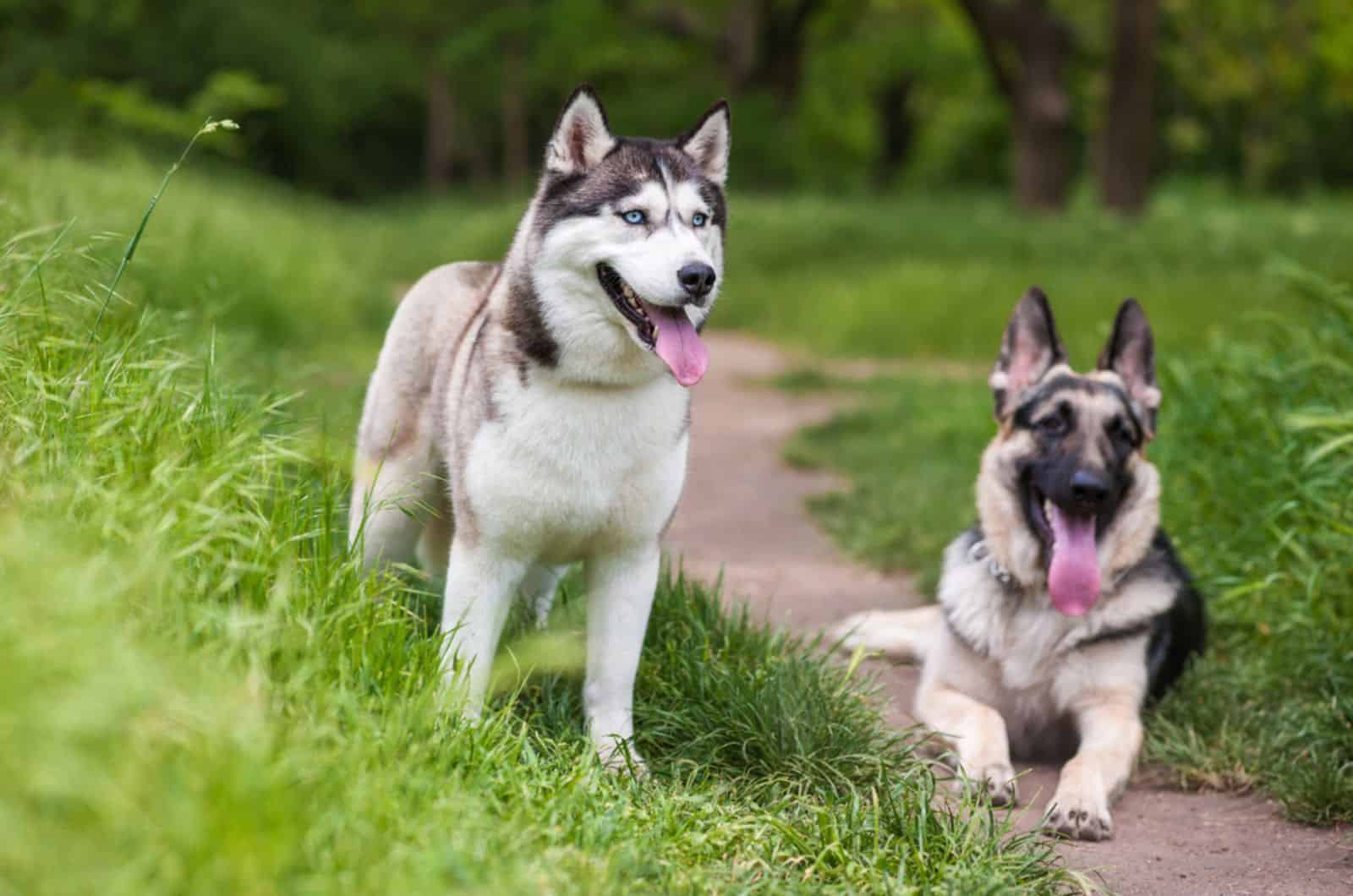Both of these breeds are huge lovable balls of fluff and cuteness! But, what do they think of each other? Today, we are answering the question: do German Shepherds and Siberian Huskies get along?
This is a commonly asked question because there are many similarities between the two breeds, however, that doesn’t guarantee that they will get along.
Owners may agonize for weeks or months before deciding whether to have two dogs in their home rather than just one.
There are various reasons you might want to do this, including the fact that you genuinely love both of them and want them to be a part of your life.
The absolute worst thing that can happen is for you to make a decision hastily without doing your research, only to realize a few months later that the two dogs you had hoped would get along – actually don’t.
So, with that in mind, we wanted to write this article and provide some insight into the topic.
Do German Shepherds And Huskies Get Along?
Of course, the answer is never a simple, black-and-white, thing. However, we can probably put your mind at ease by saying: yes, they can.
But it requires work.
There is absolutely no question that a Siberian Husky and a German Shepherd can get along just fine. They are both wonderful dog breeds that are completely safe with children and can coexist peacefully in a family setting.
There can occasionally be some bumps in the road, but that doesn’t mean that there is something inherently stopping these two beautiful dog breeds from sharing the same space.
The majority of potential issues can be prevented by timely and proper socialization of both dogs, and if problems still arise later on, they can be solved.
However, in order to be able to handle those issues, you need to be well-acquainted with the personalities, temperaments, and habits of both German Shepherds and Siberian Huskies.
That being said, we have other articles that explain why German Shepherds are so affectionate, and why Huskies can be so dramatic.
German Shepherd Temperament

Siberian Huskies and German Shepherds are different breeds of dogs, but not necessarily in a bad way. The GSD is generally renowned for being excellent with both children and other dogs, making it a terrific dog to have in your family.
Excellent Guard Dogs
They are renowned for their ability to serve as guard dogs and are often faithful and devoted to their humans. They are often kept as guard dogs and even used as police and military dogs because of these attributes.
However, their incredible devotion to their owners and the need to protect often make them skeptical toward strangers, whether they’re humans or dogs. They’re not too aggressive, but they will be protective.
Require Socialization
With the German Shepherd, socializing is prioritized more so than with the Siberian Husky. It may be a little suspicious of strangers and become anxious if it hasn’t had this initial introduction to other canines.
Therefore, it is crucial to understand your German Shepherd’s bloodline. It can display nervous characteristics if you get one that has been badly bred, which is not ideal when you’re attempting to introduce it to another dog.
Slow To Trust
One big part of their personality is their aloofness. They take their time to trust others, in other words. However, once you have won their trust, you have their lifelong loyalty.
However, it could be a little challenging to bring a Husky into your family because of this. German Shepherds are innately wary of anything novel in their environment. They might not be overly welcoming to new people or canines.
It’s a good idea to socialize your German Shepherd before adding extra dogs to your household. It’s best to do this while they are still puppies.
Without these early social interactions, you might experience behavioral issues, one of which is asserting dominance.
German Shepherds are accustomed to being independent and working by themselves, so being around a Husky could make them feel the urge to assert their dominance.
If that happens, you need to be able to assert yourself as the dominant figure in the household.
Husky Temperament

More and more families are becoming interested in the Siberian Husky breed recently, due in large part to its personality. First of all, the Husky is usually gentle, but it can also be mischievous, which is different from German Shepherds.
Prone To Separation Anxiety
The lively and mischievous Husky will constantly be curious about what you’re doing. They enjoy the company of people (or other dogs), and they struggle when left alone.
The Husky is perhaps one of the worst breeds to own if you plan to be gone for an extended amount of time.
The Husky can develop separation anxiety extremely quickly, so if you know you’ll be leaving them alone frequently and for extended periods of time, this probably isn’t the dog for you.
Highly Active Dogs
Remember, the Husky was bred to pull sleds for extended periods of time, and despite the fact that this hasn’t been its primary function for several generations, its temperament hasn’t been altered by this.
It is important to keep in mind that this urge to get outside and run is part of its personality and part of its foundation.
Strong Prey Drive
The prey drive of the Husky breed is rather strong. In other words, if you are out with the Husky and it spots a small cat that it views as prey, it will probably try to run after it.
That’s why we recommend always having your Husky on a leash when you’re outside.
Not Great Watchdogs
Because it is not aggressive and possessive, the Husky does not make a suitable guard dog.
It’s simply not in their genes to be territorial, since they are used to moving around and covering a lot of space all the time. They can be trained to be guard dogs, but you would be better off getting a different breed if that’s what you’re looking for.
However, since they have lived in packs for a long time, they have a strong sense of teamwork and camaraderie.
This makes them great working dogs and is potentially something that you can leverage in order to make your Husky friends with your German Shepherd.
What If They Are Not Getting Along?

Even with the best of intentions and all the patience in the world, things occasionally simply don’t work out.
A dog wants someone to be in charge because otherwise, it will take over. You must make sure that no dog exhibits aggressive tendencies, and if it does, you must rectify the behavior by being firm and making it obvious that the conduct is inappropriate.
Make sure to encourage good behavior when it happens, because positive reinforcement is very effective. When you observe positive interaction between the two of them, give them a treat.
If they receive a reward for their actions, they are more likely to repeat them. Additionally, you must treat both dogs equally; avoid showing one dog more affection than the other!
How To Socialize A German Shepherd And A Husky
The way these two dogs initially meet each other has a big impact on how well their relationship will work out in the future.
The best course of action is to get a Husky puppy and a German Shepherd puppy at the same time. This way they will think of each other as family, and they will quickly get accustomed to one another because they are growing up together.
But what if they didn’t know each other when they were puppies?
Introducing An Adult Husky To An Adult German Shepherd
Even if your dogs are fully grown, you can still introduce them with some degree of success. The first thing you should do is to arrange for them to meet in a neutral location.
When you bring a new dog into your home while the existing dog is still there, you are encroaching on the territory of the existing dog, and it won’t be grateful for it. The new dog will be perceived as a stranger or even as a threat.
Take your two dogs to the park instead, and keep them both leashed. Don’t let them get too close to each other at first, just get them acquainted with one another’s scents.
You can let go of their leashes once they begin sniffing one another, but be ready to take hold of their leashes again and separate them if they start acting aggressively.
Living Together In Perfect Harmony
If everything goes as planned, they will begin to play with each other. Then you may arrange for them to eventually meet in your backyard.
When the new dog is entering your home for the first time, you might want to lead your current dog out into the yard. This prevents the other dog from acting aggressively while its scent is present.
You can let your old dog back into the house after the new one has made himself at home. Separate the two and try again if tensions start to rise or if one of them attacks the other.
Separating the pets while you’re away from home is also a smart idea, and perhaps even hiring a pet sitter if you’re not too comfortable with leaving them on their own.
Final Thoughts
If you want to know do German Shepherds and Huskies get along, the short answer is yes.
If they couldn’t, would we really have the gorgeous German Shepherd and Husky mix, aka the Shepsky?
However, the long answer is – yes, but it will take some work. The purpose of this article was to outline the best approaches for creating a healthy relationship between these two dogs and making sure they can coexist.
